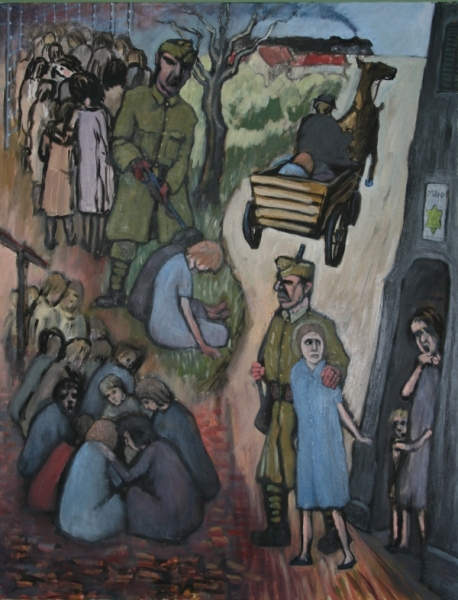
7 Agi's Story
When the Hungarian Fascists took away my eldest sister from the Star House they promised that they would return later for the Jews they had left behind. Luckily we were successfully able to find a hiding place, before they returned. The group, which included Agi, was marched to the brick factory on the outskirts of the city, which I later found out served as the collection camp for prisoners, mostly young women, who were marched off on foot to Austria. Their task there would be to dig anti-tank ditches and the survivors would have been sent to one of the extermination camps.
In the Brick factory Agi met one of her best friends and during the arduous march they sustained each other in the hungry, cold, rainy, autumn days and nights. If a young woman collapsed and could not get up, the soldier shot her. One day Agi and her friend, (unfortunately I have forgotten her name) felt that they could not take any more and refused to continue. They collapsed, exhausted.
One of the Hungarian soldiers told them to stand up but they said that they could not.
'If you do not get up I will shoot you,' he shouted.
'I do not mind,' Agi answered, 'shoot us, we cannot go on any more.'
For the soldier perhaps it was too distasteful to shoot two 18 year old girls and kill them, so giving them a little more time he said; 'I will soon return!'
He left to continue the march with the other prisoners.
Soon a peasant cart stopped beside them and the cart driver asked, 'What are you doing waiting down there? You must know that they are that they going to kill you?'
The girls said, 'We cannot go on any more.'
The wagon driver said, 'Come climb up on the wagon and hide yourselves. I will take you to the station. You can perhaps take a train from there to go back to Budapest'.
At the station there was a train that was ready to go and just in time the girls climbed up, as it moved off. When they got their breath back and looked around, they found that they were in the middle of a wagon full of German soldiers on their way to Budapest to reinforce the defences. For the Nazis the two young Hungarian peasant girls, even if they were a bit of muddy, were a welcome novelty and soon some officers invited the two girls to share their picnic. When they arrived, one of the officers was determined to escort Agi back her home. By then Mother, pretending to be a Christian refugee fleeing from the advancing Russians, had found a cooking and cleaning job in a pension.
When Mother saw Agi had returned with a Nazi officer, she nearly fainted. The German was very polite and promised to come back to meet Agi again. He did return but Mother always found an excuse as to why Agi could not go out with him.
When anybody came to our door, as a 14 year old boy I had to hide quickly. One day when two Hungarian Fascists from the Arrow Cross came to our flat and menacingly demanded documents from Mother, the German officer turned up at the same time to see Agi. Mother complained to him that the Arrow Cross 'beasts' were a nuisance; the officer commanded them to leave. Mother thanked him but was still not prepared to let Agi go out with a Nazi.
In the house there was a cinema that had been turned into a casualty centre by the Red Cross. Agi found a job there and so she was able to help supply us with some food
2008
Oil on Canvas 90 X 71 cms